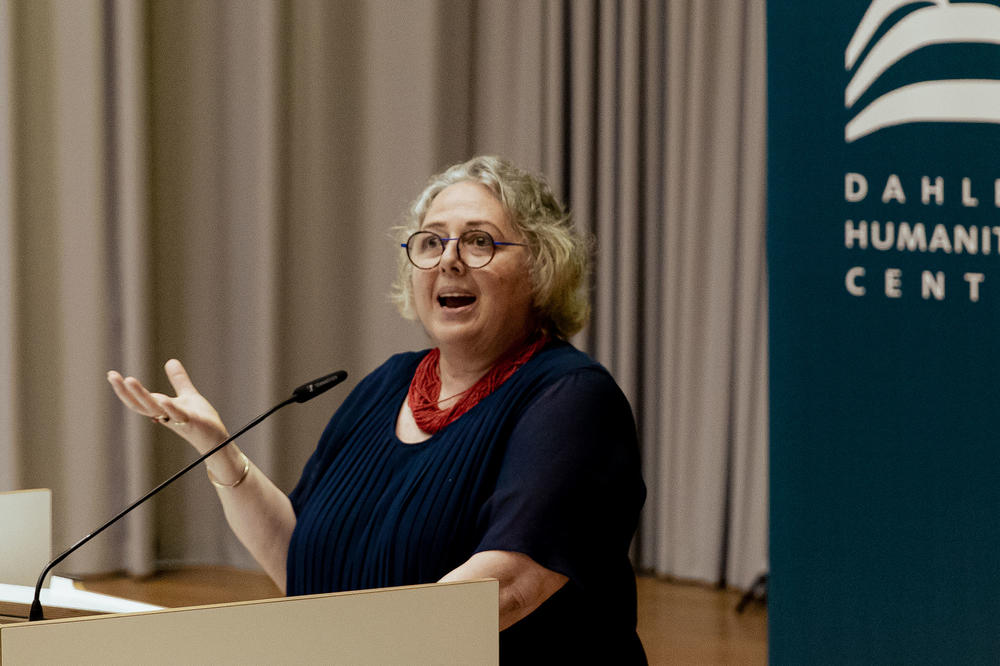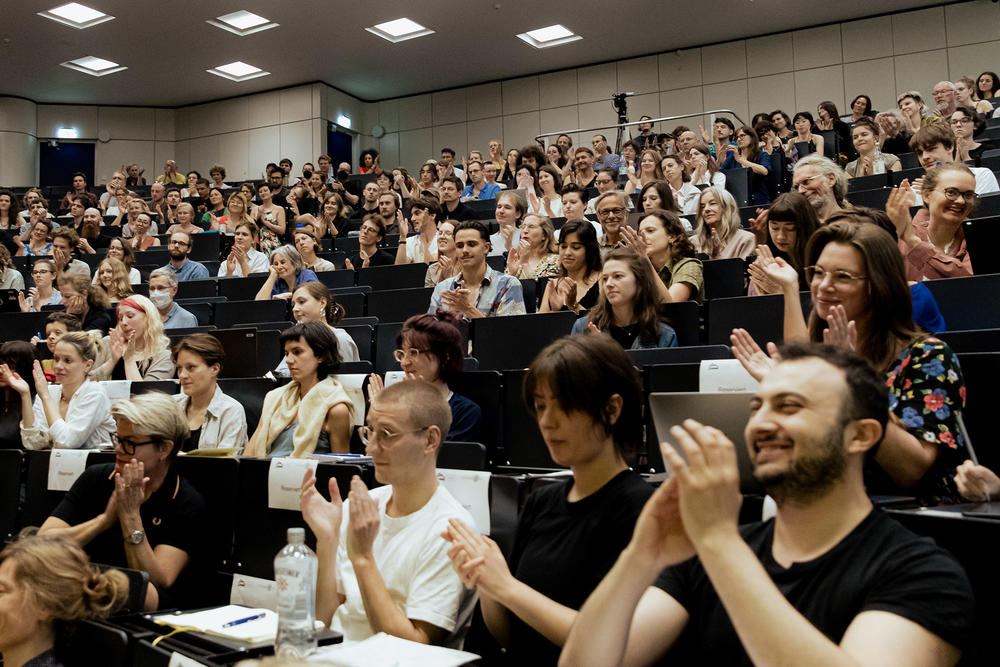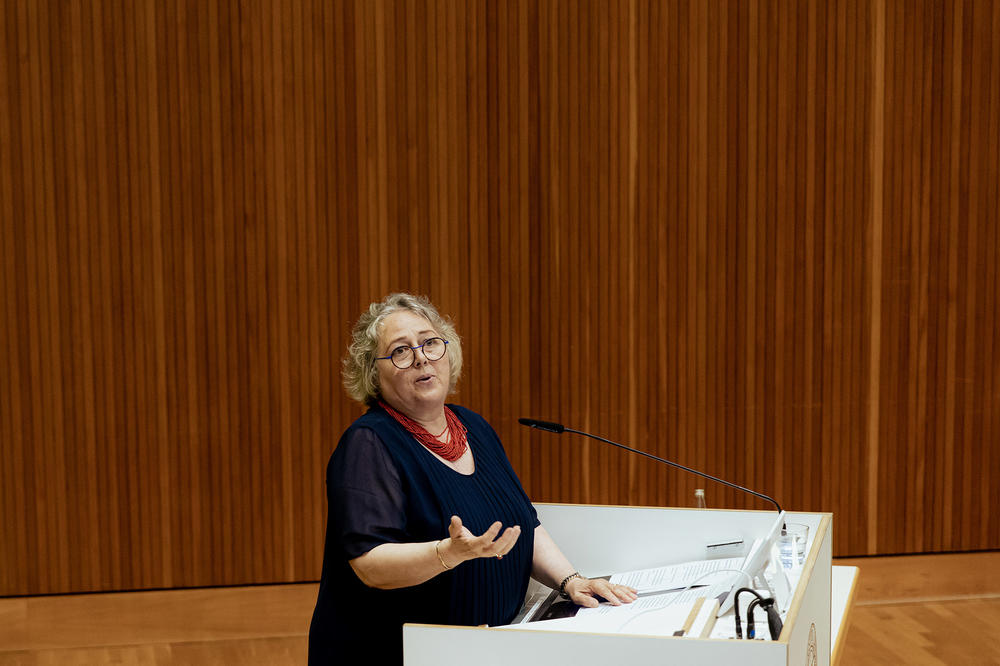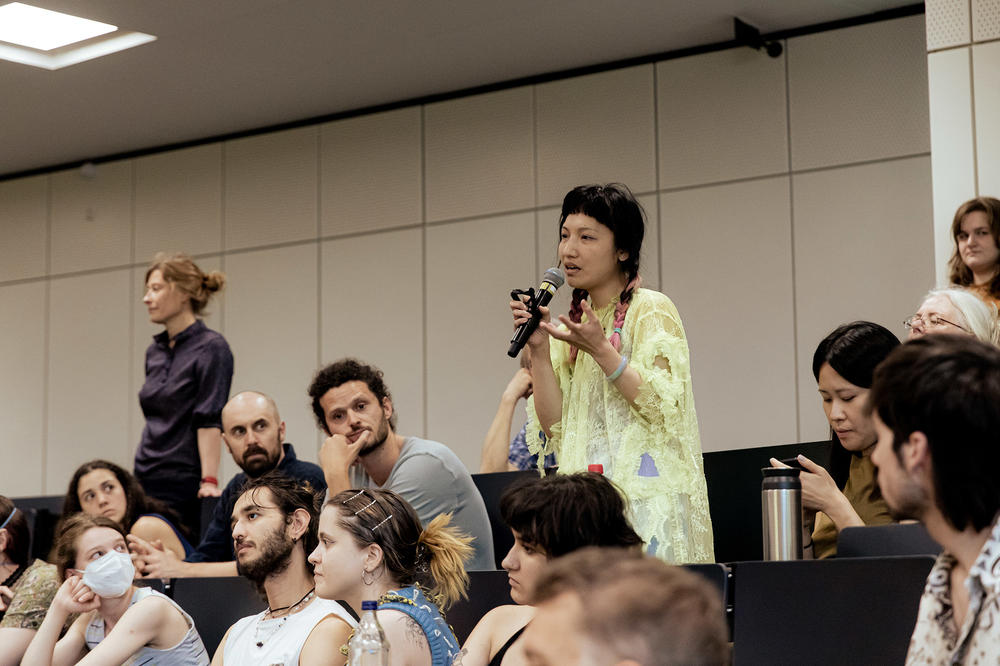Ecosystem Rather than an Ego System
In the recent Hegel Lecture, philosopher Rosi Braidotti made a case for the “philosophy of the big YES”: She propagates affirmative ethics for dealing with the catastrophic condition of the world
Aug 23, 2023
Rosi Braidotti, feminist philosopher and professor emerita of the University of Utrecht.
Image Credit: Lorenz Brandtner
The Dahlem Humanities Center of Freie Universität invites prominent scholars in the humanities to hold the annual Hegel Lecture. The lecture series has become a fixed feature in Berlin’s academic calendar, and in the past, celebrated intellectuals such as Judith Butler or Homi Bhabha accepted the invitation. In June Rosi Braidotti, one of the most important proponents of posthumanism, presented the ninth Hegel Lecture to a large audience. With her “philosophy of the big YES,” she wanted to ease people’s fears of the future.
Braidotti did not only focus on philosophical questions. She also spoke as an activist taking a stand against fellow philosophers ranging from Jordan Peterson to Peter Sloterdijk who dwell on bleak views. As an aside, she encouraged students, who made up the largest part of the 300 members of the audience, to apply for grants that would help them join in the ongoing discursive debate. Braidotti’s presentation was a performative demonstration of her understanding of affirmative thinking: She finds humor to be useful, even when dealing with dire issues. It is rare to hear so much laughter during lectures on campus.
There was a large turnout at the lecture, and in particular, many students attended.
Image Credit: Lorenz Brandtner
Pioneer of Posthumanism
Braidotti is a student of poststructuralism, having studied under Gilles Deleuze and Michel Foucault. Born in Italy, she was educated in Australia and at the Sorbonne in Paris. She has taught at the University of Utrecht in the Netherlands since 1988. In her introduction to the lecture, Doris Kolesch, a professor of theater studies and a member of the Dahlem Humanities Center, described Braidotti as a “living manifestation of the nomadic thought that is at the core of her work.” Braidotti adheres to a school of thought that places people in a networked world somewhere between mammals and machines, pushing them from their pedestal, and in doing so, replacing nothing less than humanism, according to Kolesch.
In her Hegel Lecture at Freie Universität, Braidotti presented her “Affirmative Ethics,” wherein confidence plays a special role. Her ethics emphasizes creative and emancipatory social forces as transformative. Such forces oppose a rigid adherence to the status quo. Early in her lecture she made it clear that she is not interested in the optimistic “wellness industry” or in making people feel good. Furthermore, affirmative ethics does not encourage individuals to adapt better to catastrophe, which is a widespread aspiration of neoliberal self-optimization fantasies, but rather to recognize that the world is in a catastrophic state.
With humor and enthusiasm, Rosi Braidotti encouraged people to avoid resignation and embrace technological advances.
Image Credit: Lorenz Brandtner
Between Right-wing Panic and Capitalist Belief in Technology
For Braidotti affirmation does not mean agreeing with what is given. She used three examples to illustrate what kinds of problems affirmative ethics deals with. The first example is artificial intelligence. Many people are concerned about the unpredictable consequences of thinking computers, but developing artificial intelligence can also bring great advantages. Braidotti explains that affirmation does not mean just focusing on the positive, as that could lead to blind optimism in progress. She rejects the ideology of the tech industry.
She rejects fear-mongering to an even greater degree because she views such scare tactics as a fundamental characteristic of fascist thinking, be it the fear of the unknown or fear of conspiracies. Her affirmative ethics serves as an antidote to the catastrophe thinking of the right.
What is the best course of action against actual dangers? Braidotti recommended a pragmatic assessment of the situation. The “threatening” technology is already widespread in our everyday lives. Thus, fear of a future ruled by machines is superfluous as machines are already inextricable from our reality today. We have literally incorporated computer chips, neural implants, and other devices as parts of us. Braidotti said that losing a mobile phone is equivalent to losing one’s memory. An anti-technology attitude simply ignores reality.
Following her one-hour lecture, Rosi Braidotti answered questions from the audience.
Image Credit: Lorenz Brandtner
Inseparably Linked with Nature
“We are all part of the problem that we are trying to solve,” said Braidotti. People are not separate from the problem, just because they are against it. It is important to ask: How much leeway can we negotiate, if none of us wants to forsake the technical progress that pollutes the Earth and causes mental and social problems, while undoubtedly bringing huge benefits? “Let us accept that we are all technologically mediated. Accepting is a way of beginning, of actually accounting for our own technological dependence. Would it not be better if we had a collective discussion about this?”
In Braidotti’s second example, the climate crisis, she said that it is also necessary to accept interdependence. In her affirmative ethics, climate should not be considered as a problematic subject to be mastered, but rather as something with which people are inseparably interlinked. While humans may be responsible for climate change, it is now crucial to expand the idea of solidarity inherent in humanity with regard to other human beings to include solidarity with nonhuman life and the Earth itself.
In this regard Braidotti referred to the philosopher Spinoza. She said that his idea of “radical immanence” implies a fundamental equality of all beings. Within this concept, humans, who for centuries viewed themselves as the crown of creation, lose their special position, becoming the hub of a widely branched and interlocking world in which everything has an effect on everything else and everything interacts. Braidotti pointed out the paradox here, namely that from this perspective, human nature can be understood better when it is no longer at the center of our understanding of the world, or as she put it, “We could have an ecosystem rather than an ego system.”
The original German version of this article appeared in campus.leben, the online magazine published by Freie Universität Berlin.




